Beautiful, Austrian-born actress Jester Naefe (1924-1967) had a short film career in the German cinema with highlights in the late 1940s and the mid-1950s. Because of her roles and her sexy looks, the press labelled her the ‘German Marilyn Monroe’.
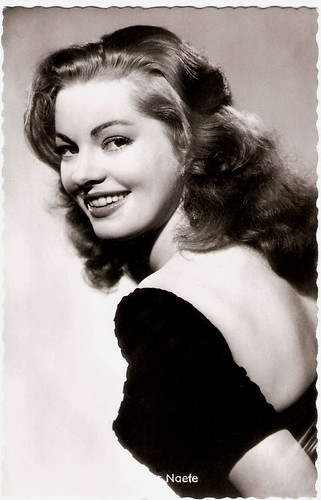
German card by Kolibri-Verlag, no. 2975.
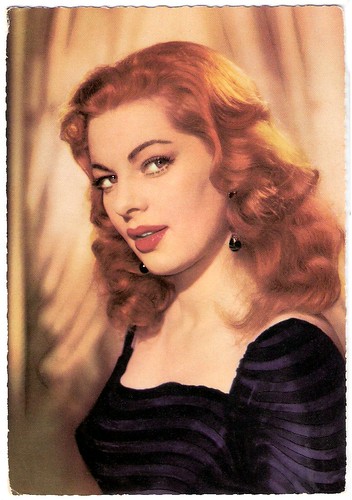
German postcard by ISV, no. C 4. Photo: Divina / Gloria / Grimm.
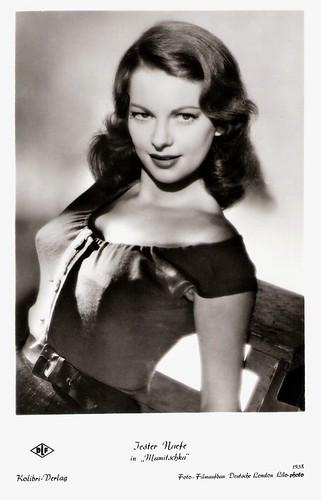
German card by Kolibri-Verlag, no. 1528. Photo: Filmaufbau / Deutsche London / Lilo-photo. Still from Mamitschka (Rolf Thiele, 1955).

German postcard by Kolibri Verlag, no. 1954. Photo: publicity still for Die goldene Brücke / The Golden Bridge (Paul Verhoeven, 1956). Collection: Meiter.
Jester-Helene Naefe was born in 1924 in Vienna, Austria. She was the daughter of a truck driver, Herbert Naefe.
At the age of 16, Jester went to Berlin to follow acting lessons at the Ackermann Theatre School. Soon she appeared on stage in the Breslauer Schauspielhaus in Breslau and in the Intimen Theatre in Hamburg. In 1948, producer-director Rolf Meyer gave her her first film part in the short film Sie sind nicht gemeint / You Were Not Meant (Answald Krüger, 1948) with Erik Ode.
This debut was soon followed by more secondary roles in Diese Nacht vergess ich nie / I'll Never Forget That Night (Johannes Meyer, 1949) with Gustav Fröhlich, Der bagnosträfling / The Prisoner (Gustav Fröhlich, 1949) with Paul Dahlke, Wer bist du, den ich liebe? / Who Is This Person I Love? (Géza von Bolváry, 1949) with Iván Petrovich, and Das Fräulein und der Vagabund / The Girl and the Tramp (Albert Benitz, 1949) with Hardy Krüger.
In 1949, she married the rich, Hungarian business entrepreneur Alfred Tauszky. Jester stopped making films to concentrate on family life. The marriage was tumultuous: Tauszky slapped her in public during a reception in Bad Oldesloe. In 1951, the couple had to leave Hamburg for Rome when Tauszky was prosecuted for tax evasion.
Naefe and Tauszky had two daughters, Vivian (1952) and Silvia (born 1953). In 1953, Tauszky deserted his family and fled to Caracas, Venezuela. Jester returned with her daughters to Germany, first to Hamburg, later to Munich (München).

German postcard by Kolibri-Verlag. Collection: Meiter.
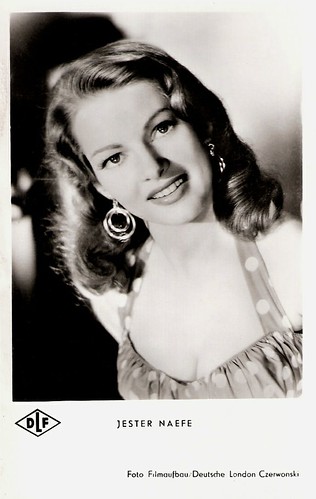
German postcard by Kunst und Bild, Berlin, no. I 413. Photo: Filmaufbau / Deutsche London / Czerwonski. Publicity still for Mamitschka (Rolf Thiele, 1955).
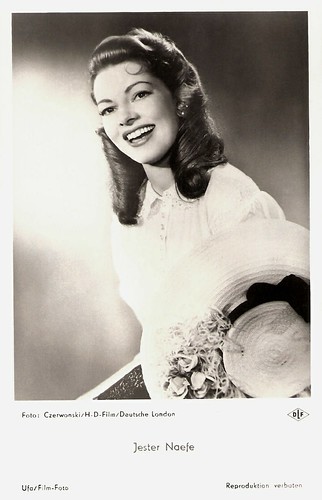
German postcard by Ufa, Berlin-Tempelhof, no. FK 2151. Photo: Czerwonski / H-D-Film / Deutsche London.

German postcard by Ufa, Berlin-Tempelhof, no. FK 1454. Photo: Arthur Grimm / CCC-Film / Allianz. Publicity still for Stern von Rio / Star from Rio (Kurt Neumann, 1955).
Jester Naefe took up her film career in 1954, and the flamboyant beauty would make twelve films in the following three years. Among these films were Die Kleine Stadt will schlafen gehen / The Little Town Will Go to Sleep (Hans H. König, 1954), Le destructeur / Das bekenntnis der Ina Kahr / Confession of Ina Kahr (Georg Wilhelm Pabst, 1954), co-starring with Curd Jürgens, Stern von Rio / Star from Rio (Kurt Neumann, 1955) with Willy Fritsch, and Die Goldene Brücke / The Golden Bridge (Paul Verhoeven, 1956) with Paul Hubschmid.
Her most famous role was as Lydia in the remake of the 1932 film operetta Der Kongress tanzt / Congress Dances (Franz Antel, 1955). In 1957, during the shooting of the Italian-German coproduction La Ragazza della salina / Sand, Love and Salt (František Cáp, 1957) in Portoroz, Yugoslavia, she had a fighting scene with lead actress Isabella Corey. During the scene, she fell and hit the back of her head on a rock.
She soon started getting bad headaches, and the headaches were followed by temporary paralysis. Despite her illness, she finished the film, co-starring Marcello Mastroianni. Easter 1958, her illness seemed vanished, and she went to the USA for a TV show. Hollywood star Gregory Peck reportedly called her ‘one of the most attractive and beautiful women in the world’.
In 1959, she was treated again at a Munich hospital, and her illness was diagnosed as multiple sclerosis. Jester Naefe had to retire from the film business. In the 1960s, when the medical bills consumed all of her earnings, she retired to live with her mother in her modest home in Wolfratshausen in Upper Bavaria.
After a long and painful period of illness, she died in 1967 in Geretsried, near Wolfratshausen, forgotten by her colleagues and the public. She was only 42, although the obituaries gave her age as 37. Her daughter Vivian Naefe is now a celebrated film and TV director.
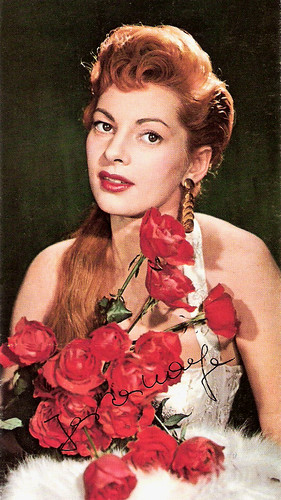
German card by Lux.
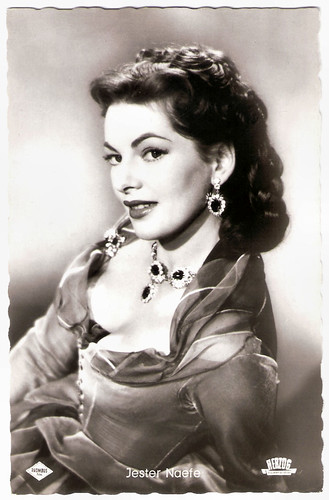
German postcard by Kolibri-Verlag, no. 2027. Photo: Rhombus / Herzog-Film / Czerwonski. Publicity still for Lumpazivagabundus / Gentleman-vagabond (Franz Antel, 1956).
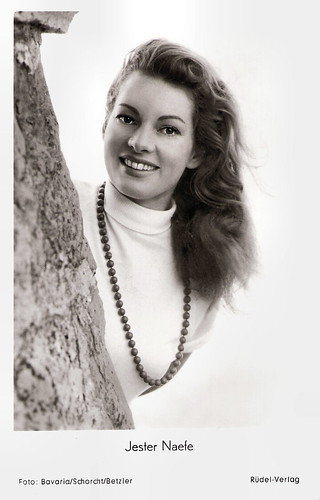
German postcard by Rüdel-Verlag, Hamburg-Bergedorf, no. 1907. Photo: Bavaria / Schorcht / Betzler. Publicity still for La ragazza della salina / Sand, Love and Salt (Frantisek Cáp, 1957).
Sources: Philippe Pelletier (CinéArtistes.com), Glamour Girls of the Silver Screen, Wikipedia (German), and IMDb.
This post was last updated on 1 December 2025.

German card by Kolibri-Verlag, no. 2975.

German postcard by ISV, no. C 4. Photo: Divina / Gloria / Grimm.

German card by Kolibri-Verlag, no. 1528. Photo: Filmaufbau / Deutsche London / Lilo-photo. Still from Mamitschka (Rolf Thiele, 1955).

German postcard by Kolibri Verlag, no. 1954. Photo: publicity still for Die goldene Brücke / The Golden Bridge (Paul Verhoeven, 1956). Collection: Meiter.
Tumultuous marriage
Jester-Helene Naefe was born in 1924 in Vienna, Austria. She was the daughter of a truck driver, Herbert Naefe.
At the age of 16, Jester went to Berlin to follow acting lessons at the Ackermann Theatre School. Soon she appeared on stage in the Breslauer Schauspielhaus in Breslau and in the Intimen Theatre in Hamburg. In 1948, producer-director Rolf Meyer gave her her first film part in the short film Sie sind nicht gemeint / You Were Not Meant (Answald Krüger, 1948) with Erik Ode.
This debut was soon followed by more secondary roles in Diese Nacht vergess ich nie / I'll Never Forget That Night (Johannes Meyer, 1949) with Gustav Fröhlich, Der bagnosträfling / The Prisoner (Gustav Fröhlich, 1949) with Paul Dahlke, Wer bist du, den ich liebe? / Who Is This Person I Love? (Géza von Bolváry, 1949) with Iván Petrovich, and Das Fräulein und der Vagabund / The Girl and the Tramp (Albert Benitz, 1949) with Hardy Krüger.
In 1949, she married the rich, Hungarian business entrepreneur Alfred Tauszky. Jester stopped making films to concentrate on family life. The marriage was tumultuous: Tauszky slapped her in public during a reception in Bad Oldesloe. In 1951, the couple had to leave Hamburg for Rome when Tauszky was prosecuted for tax evasion.
Naefe and Tauszky had two daughters, Vivian (1952) and Silvia (born 1953). In 1953, Tauszky deserted his family and fled to Caracas, Venezuela. Jester returned with her daughters to Germany, first to Hamburg, later to Munich (München).

German postcard by Kolibri-Verlag. Collection: Meiter.

German postcard by Kunst und Bild, Berlin, no. I 413. Photo: Filmaufbau / Deutsche London / Czerwonski. Publicity still for Mamitschka (Rolf Thiele, 1955).

German postcard by Ufa, Berlin-Tempelhof, no. FK 2151. Photo: Czerwonski / H-D-Film / Deutsche London.

German postcard by Ufa, Berlin-Tempelhof, no. FK 1454. Photo: Arthur Grimm / CCC-Film / Allianz. Publicity still for Stern von Rio / Star from Rio (Kurt Neumann, 1955).
Sand, love and salt
Jester Naefe took up her film career in 1954, and the flamboyant beauty would make twelve films in the following three years. Among these films were Die Kleine Stadt will schlafen gehen / The Little Town Will Go to Sleep (Hans H. König, 1954), Le destructeur / Das bekenntnis der Ina Kahr / Confession of Ina Kahr (Georg Wilhelm Pabst, 1954), co-starring with Curd Jürgens, Stern von Rio / Star from Rio (Kurt Neumann, 1955) with Willy Fritsch, and Die Goldene Brücke / The Golden Bridge (Paul Verhoeven, 1956) with Paul Hubschmid.
Her most famous role was as Lydia in the remake of the 1932 film operetta Der Kongress tanzt / Congress Dances (Franz Antel, 1955). In 1957, during the shooting of the Italian-German coproduction La Ragazza della salina / Sand, Love and Salt (František Cáp, 1957) in Portoroz, Yugoslavia, she had a fighting scene with lead actress Isabella Corey. During the scene, she fell and hit the back of her head on a rock.
She soon started getting bad headaches, and the headaches were followed by temporary paralysis. Despite her illness, she finished the film, co-starring Marcello Mastroianni. Easter 1958, her illness seemed vanished, and she went to the USA for a TV show. Hollywood star Gregory Peck reportedly called her ‘one of the most attractive and beautiful women in the world’.
In 1959, she was treated again at a Munich hospital, and her illness was diagnosed as multiple sclerosis. Jester Naefe had to retire from the film business. In the 1960s, when the medical bills consumed all of her earnings, she retired to live with her mother in her modest home in Wolfratshausen in Upper Bavaria.
After a long and painful period of illness, she died in 1967 in Geretsried, near Wolfratshausen, forgotten by her colleagues and the public. She was only 42, although the obituaries gave her age as 37. Her daughter Vivian Naefe is now a celebrated film and TV director.

German card by Lux.

German postcard by Kolibri-Verlag, no. 2027. Photo: Rhombus / Herzog-Film / Czerwonski. Publicity still for Lumpazivagabundus / Gentleman-vagabond (Franz Antel, 1956).

German postcard by Rüdel-Verlag, Hamburg-Bergedorf, no. 1907. Photo: Bavaria / Schorcht / Betzler. Publicity still for La ragazza della salina / Sand, Love and Salt (Frantisek Cáp, 1957).
Sources: Philippe Pelletier (CinéArtistes.com), Glamour Girls of the Silver Screen, Wikipedia (German), and IMDb.
This post was last updated on 1 December 2025.
3 comments:
Such a sad end for this great beauty. Thanks Bob.
Hello there! Long time no see--I've missed you. I would have been in touch a bit sooner, but we've had a LOT happen over the past few months--including a chimney fire and all that goes into a cleanup like that.
I love reading your blog. I learn so much about people in the entertainment business--and from all over the world. It is interesting to hear of their lives--especially now'adays when much of their stories are lost.
Thank you, Bob!
"Kein Zweifeln mehr! Sie tritt ans Himmelstor,
Zu ihren Armen hebt sie dich empor.
So warst du denn im Paradies empfangen,
Als wärst du wert des ewig schönen Lebens;
Dir blieb kein Wunsch, kein Hoffen, kein Verlangen,
Hier war das Ziel des innigsten Bestrebens,
Und in dem Anschaun dieses einzig Schönen
Versiegte gleich der Quell sehnsüchtiger Tränen..."
"No longer doubt! Descending from the sky,
She lifts thee in her arms to realms on high.
And thus thou into Paradise wert brought,
As worthy of a pure and endless life;
Nothing was left, no wish, no hope, no thought,
Here was the boundary of thine inmost strife:
And seeing one so fair, so glorified,
The fount of yearning tears was straightway dried..."
Post a Comment